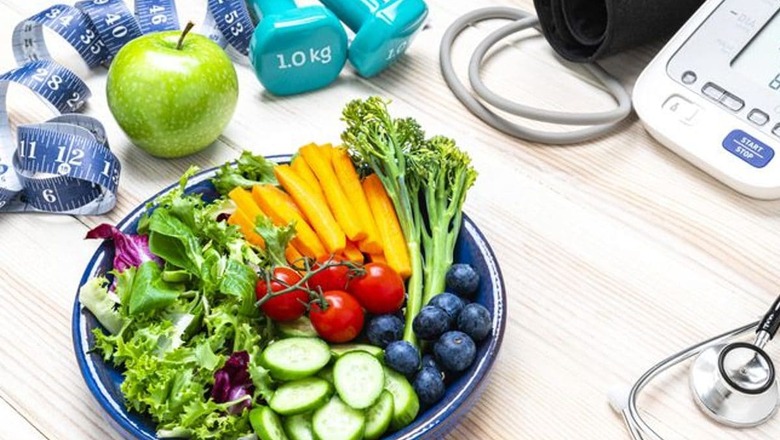
views
You can find cholesterol, a waxy substance, in your blood. Having too much cholesterol may increase your risk of getting heart disease even though your body requires it to build healthy cells. High cholesterol can increase the risk of a heart attack, stroke, and chest pain. Eating healthy and exercising frequently can help control cholesterol. You should also stop smoking, consume alcohol in moderation, and maintain a healthy weight if you wish to lessen the risks associated with high cholesterol.
Although high cholesterol can run in families, it is more usually brought on by bad lifestyle decisions, making it both treatable and preventable. A healthy diet, persistent exercise, and occasionally medication can all help lower high cholesterol.
10 Superfoods That Are Good for Your Health
- Olive Oil: Cooking with olive oil is preferred to using vegetable oil or ghee, as is common knowledge. Powerful antioxidants and minerals like Vitamins E and K are abundant in extra virgin olive oil. Some of these antioxidants can prevent LDL particle oxidation and lower blood vessel inflammation. Additionally, it is known to lower blood pressure. So switch to this healthier alternative instead of vegetable oil.
- Coconut Oil:Up to 90% of the fatty acids in coconut and coconut oil are saturated, making them the highest source of saturated fat on Earth. Medium-chain fatty acids, such as those found in coconuts, are metabolised differently and travel directly to the liver where they are changed into ketone bodies. Additionally, coconut oil suppresses your appetite, causing you to eat less and hence consume less calories. The oil alone, however, can increase metabolism by providing up to 120 calories each day. It is also very nourishing.
- Cheese:Who said all wholesome foods had to be bland? One item in particular has been credited with improving the flavour of the majority of junk foods. Cheese is a strong source of protein and contains all the beneficial components of milk, such as calcium, vitamin B12, phosphorus, and selenium. The amount of protein in one slice of cheese is equivalent to one glass of whole milk, or 6.7 grammes.
- Dark Chocolate:Dark chocolate is another delicious food that you may eat as much of as you want without feeling bad. Along with being high in antioxidants, dark chocolate is also high in minerals like iron, copper, magnesium, and manganese, as well as 1% of its weight in fibre. Additionally, it contains a lot of healthy fat. According to studies, persons who indulge in dark chocolate have a lower risk of developing heart disease than those who don’t. By preventing skin damage, dark chocolate also aids in the battle against ageing.
- Red wine:Research has shown that consuming one glass of red wine every day—or two glasses for men—can lower your risk of developing heart disease. This is due to red wine’s ability to introduce HDL into the bloodstream. Red wine should not be consumed, nevertheless, if your triglycerides are high. It is not suggested to start drinking if you don’t already for the sole purpose of lowering your risk of heart disease. Before you start drinking, talk to your doctor.
- Nuts:Heart-healthy fat-rich nuts like peanuts, walnuts, and pistachios also contain plant sterols, which prevent the blood from absorbing harmful cholesterol. Furthermore, they contain a lot of fibre and the mineral magnesium. Include nuts in your breakfast routine by including them in your salad or yoghurt bowl. They can also be included in fruit smoothies. Consume them moderately if you’re watching your weight, though.
- Fatty Fish:Fish that are high in Omega-3 fatty acids, such as salmon, can raise HDL levels and lower LDL levels. Sardines, tuna, and mackerel are some other fatty fish. To raise the quantity of good cholesterol in your blood, try to eat at least two servings of fatty fish per week. These are a good source of protein too. Many fish oil pills are readily available in pharmacies around the world. If you are unable to get the recommended amount of fish, take the tablets.
- Whole eggs:Since the yolk is rich in fat and cholesterol, many people simply consume the white of the egg. But it’s not a good habit. 168 mg of cholesterol, or about 62 percent of the daily recommended consumption, can be found in one medium-sized whole egg. In addition to being packed with vitamins and nutrients, egg cholesterol does not increase levels of bad cholesterol in the blood. Additionally full and high in protein, eggs are advantageous for weight loss.
- Yogurt:Real full-fat yoghurt is very nutrient-dense and contains the same vitamins and minerals as all other high-fat dairy products. Additionally rich in beneficial probiotic bacteria, yoghurt aids in better digestion, the prevention of heart disease, and the reduction of weight. However, you must be quite cautious while selecting yoghurt because many of them are only high in sugar and low in fat content.
- Avocado:Unlike other fruits, avocados are high in fats rather than carbohydrates. The fruit has a fat content that is roughly 77% higher than that of animal fat. The primary fatty acid in avocados is the monounsaturated fat oleic acid, which provides a number of health advantages, including lowering blood vessel inflammation. Avocados are high in fibre and have been shown to reduce blood triglyceride and LDL cholesterol levels, hence reducing the risk of heart disease.

















Comments
0 comment